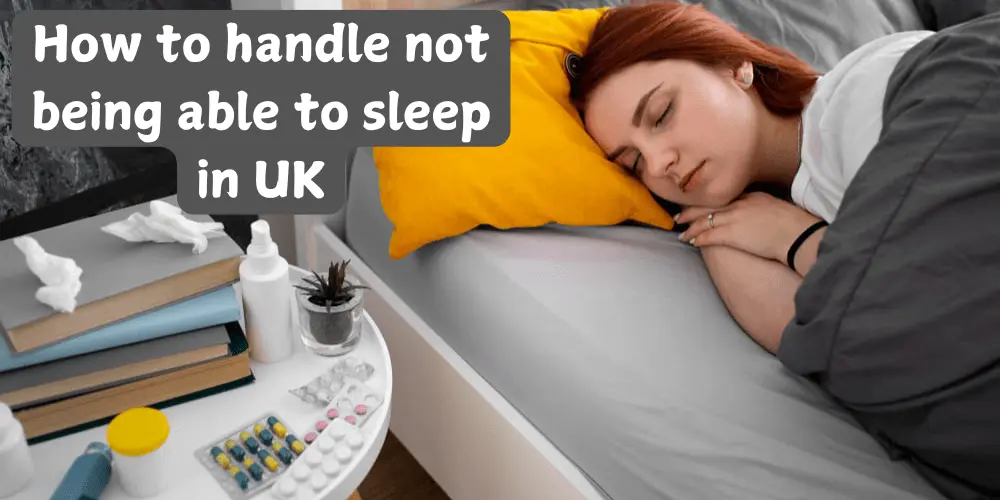How to handle not being able to sleep in UK

What does sleep have to do with mental health?
Getting enough sleep is linked to good mental health. Having a mental health issue can make it hard to sleep, and not getting enough sleep can hurt your mental health.
"Most individuals experience a night of poor sleep now and then, but chronic or persistent insomnia develops in 10–15% of the general population who are the most vulnerable and subject to the proper sleep-disruptive circumstances."
What could be wrong with my sleep?
Sleep is essential for everyone, but many need help getting it. You may be able to relate to some of the things written below, or you may have other sleep problems that aren't mentioned here.
Maybe you:
-
It's called insomnia if you have trouble falling asleep, staying asleep, or getting up when you want to. The NHS website has more information on this condition.
-
Have issues that keep you from sleeping, like panic attacks, flashbacks, dreams, or psychosis.
-
It could be because you're not getting enough good sleep or because of health problems if you find it hard to wake up or get out of bed.
-
If you sleep a lot, you might be asleep when you need or want to be awake.
-
Be more likely to feel anxious, depressed, or suicidal and be more likely to have psychotic episodes –
-
Poor sleep can trigger mania, psychosis, or paranoia or make existing symptoms worse,
-
Feel lonely or isolated – for example, if you don't have the energy to see people or they don't seem to understand
-
The struggle to concentrate or make plans and decisions, feeling irritable or not having the power to do something,
-
Having problems with day-to-day life – for example, at work or with family and friends being more affected by other health problems, including mental health problems.
Possible reasons why you can't sleep
Several things can keep us from getting enough sleep.
-
Others may have trouble sleeping because they are anxious, worried about upsetting events, or have other problems.
-
Disorders that affect sleep are also called sleep disorders.
-
being a parent or caretaker
-
taking medicine, including starting or stopping medicine; using drugs and Alcohol for fun;
-
Going to work at night or on shifts
-
pain in the present or past
-
Many mental and physical health issues can make it hard to sleep.
For more information about sleep disorders, see the Mental Health Foundation.
Note: If sleep problems make you feel bad or get in the way of your daily life, you should see a doctor. They can check your health and help you get care and support. You could keep a sleep log to show your doctor how much sleep you get.
How could having mental health issues keep me from sleeping?
Your mental health could get in the way of your sleep in many ways if you have one. As an example:
- Thoughts that race or repeat themselves, as well as fears that keep you awake, can be caused by anxiety. Stress attacks could happen while you're trying to sleep, too.
- Seasonal affective disorder (SAD) and depression can make you sleep more, either by making you stay in bed longer or by making you sleep more often. Depression can also make it hard to sleep.
- These things can keep you from sleeping if you've been through stress. They can be flashbacks, nightmares, or night terrors. Sometimes, you might not feel safe or suitable in bed or at night.
- People who are paranoid or psychotic may find it hard to sleep. You might hear sounds or see things that scare or bother you.
- When you're manic, you might feel energized and happy, so you might not want to sleep or feel tired. Having racing thoughts can also keep you up at night and make sleeping hard.
- Psychiatric drugs can have side effects like sleeplessness, trouble sleeping, dreams, and sleeping too much. Stopping mental drugs can also make it hard to sleep.
How many hours of rest do I require?
Healthy adults need between 7 and 9 hours of sleep each night. But the amount of sleep we need depends on age, health, and personal situations. Also, some people naturally sleep more than others.
That depends on the person; a newborn can sleep 8 to 16 hours. Teenagers, kids, and babies need more sleep because they are still growing.
Common Asked Questions about Sleeping Problem
How often do people in the UK have trouble sleeping?
Around one in three people in the UK are thought to have this problem.
What's making me wake up at night UK?
A person's present physical or mental health, childhood, the things that happen to them, and even their personality can all affect how well they sleep. Bad sleep habits, on the other hand, like not slowing down or relaxing before bed, can make it hard to sleep.
Is five hours of sleep enough?
Experts say people should sleep at least 7 hours every night for better health. Sleeping less than 5 hours every night can be stormy for your mental and physical health. Memory, mood, focus, immunity, and general quality of life can all be affected by not getting enough sleep.
Should you wake up every two hours?
Every night, everyone wakes up a few times. It's normal to fall asleep and wake up about every 90 minutes to two hours. But getting up a lot can make it hard to do things physically, emotionally, and mentally.
Please log in to add a comment.
Popular Posts
Sleep Problems in Women: What UK Women Need to Know
How to handle not being able to sleep in UK
Managing Stress and Insomnia with Zopiclone Tablets: A Guide 2025
Zopiclone Withdrawal Symptoms, How to Manage Them
Chronic Insomnia? Here's How Zopiclone Can Help (A Safe Guide)
Is Zolpidem Better Than Zopiclone in the UK? A Comprehensive Comparison
Buy Zopiclone in London: NEXT-DAY Delivery for Better Sleep
Zopiclone mixed with alcohol and other drugs
Our Popular Treatments

Dr. John
Meet Dr. John Wood, a distinguished figure in the field of medicine whose career spanned over 25 years and left an indelible mark on patient care. Though he has retired from active clinical practice, his passion for healthcare remains as vibrant as ever. Dr. Wood’s extensive knowledge and experience are now channeled into our pharmacy's blog, where he shares insights that educate and empower our valued customers. His contributions not only reflect his commitment to public health but also help demystify complex medical topics for everyday readers.
.svg)
Delivered in secure, plain packaging on fully tracked delivery from just £10.

Our team of doctors and pharmacists, and our support staff, are all UK-based.
.svg)
Have a question? Telephone support is always free; Monday - Friday, 9am - 5pm.

Comments........!